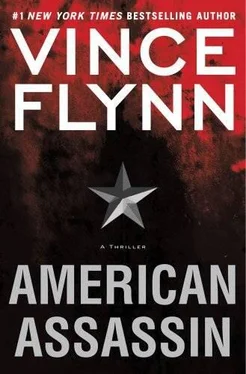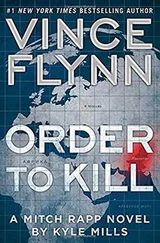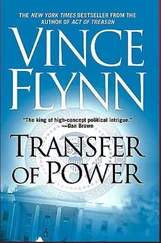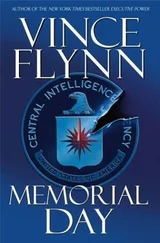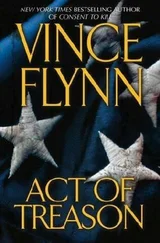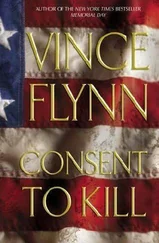Ismael was a good hundred feet in front of him. Not an easy shot standing still, let alone running and aiming at a moving target. Rapp kept the pistol at his side. Long black coat, black pants, black shoes, and a black gun. Black on black. Nothing to see. He was gaining on Ismael with every stride, staying low, the top of his head just barely visible over the roofs of the vehicles. And then Ismael saw him as Rapp passed from one car to the next. There was now no more than seventy feet of separation. Just over twenty yards. Either the man was really slow or Rapp was really fast, or probably both.
Sixty feet and closing was the best Rapp could figure when they locked eyes. Rapp started to raise his pistol to fire, but before he had it leveled, Ismael was swinging the bag around and then all hell broke loose. The bag exploded, spitting red-orange flashes on the dark street. Rapp turtled, dropping behind a nice piece of German steel. Counting shots was not an option with whatever it was in the overnight bag. The rate of fire told Rapp that it was probably an Uzi or a MAC-10. To the uninitiated, a gun was a gun, but in his new line of work, caliber was every bit as important as rate of fire. Since the Mercedes had no problem stopping the rounds, Rapp concluded it was a 9mm Uzi. If it had been the MAC-10 he would have felt the punch of the.45 caliber rounds as they penetrated the body and rattled around the interior of the car.
Rapp glanced at his watch as glass rained down on him from the blown-out windows. He could picture, in his mind’s eye, the Libyan backing up as he laid down fire. The Uzi he was firing used either twenty-, thirty-two-, or forty-round magazines. The forty was unlikely because it probably wouldn’t fit in the bag, and if it was twenty he would be done already, so that meant it was thirty-two rounds and he was almost out. And once Rapp heard the click it would be over. There was no way the guy could pull a weapon like that out of a bag and reload it before Rapp was on him.
The bullets stopped, the noise replaced by a half dozen car alarms that were now chirping and beeping and screeching and flashing. Rapp came up with his weapon this time, his finger on the trigger, ready to fire. Ismael was gone. Rapp caught a glimpse of him farther down the block and tore off, again staying in the street so he could use the cars for cover. The clock in his head was marking time as he pressed his advantage. He closed again to within sixty feet. Ismael looked over his shoulder, raised the bag, and let loose another burst. Rapp went into a crouch behind a car but kept moving. Rapp couldn’t be sure if it was a four- or five-round burst, but it had stopped and Ismael was on the run again. Rapp, thinking the gun was out of bullets, or close to being out, ran tall now, more worried about speed than cover.
Ismael made it to the corner and turned left. Rapp stayed wide again, and when he cleared the corner, he came upon the unwelcome sight of Ismael standing there with his left arm wrenched around a woman’s throat. Rapp didn’t look at her. He didn’t want to look at her. Old, young, fat, skinny, none of it mattered. Ismael’s right hand was still in the duffel bag, gripping the Uzi, which might or might not be out of bullets. Ismael started screaming at him to drop his weapon or he would kill the woman. Rapp continued to close as he had been taught. His pistol was up, directly in front of his face, an extension of his left eye, which was attached to his brain, which was still counting the seconds and telling him to finish this and get the hell out of there.
The woman was now screaming, and for the first time Rapp noticed she had a small dog on a leash that was yipping and snapping at Ismael’s legs. He had no doubt that Ismael would kill the woman, but what purpose would it serve? If Ismael had any bullets left in that gun he would turn it on Rapp right now and zip him with a nice burst to the chest. If he shot the woman, he was a dead man, and he didn’t want to die, as he had proven very loudly over the last half minute. His only way out of this was to kill the man who had been chasing him. He was nicely shielded by the woman. All he had to do was swing the bag around and unload. Rapp stopped at twenty feet and decided that since Ismael hadn’t taken aim at his chest, he was bluffing.
In the end, it was the dog that tilted things in Rapp’s favor. Ismael wisely tried to create some distance between them by stepping back. What he didn’t know, because he hadn’t bothered to look down, was that the little yipping dog had run a couple of circles around them, and his leash had formed a nice little lasso around the Libyan’s ankles. Ismael stumbled and jerked to his left to catch himself. For a brief second, the side of his head was clearly visible. Rapp was now only twenty feet away. He squeezed the trigger once, and that was all it took.
BEIRUT, LEBANON
HURLEY stepped onto the roof, a bottle of Jack Daniel’s in his hand, his thoughts already traveling back in time. The hotel was in a neighborhood called Bourj Hammoud. It was controlled by the Armenians, which was why Hurley had decided to stay here for the night. The Armenians were one of the few factions that had managed to stay neutral during the civil war. There had been a few shots fired between the Armenians and their Maronite neighbors, but no major battles.
It had been a strange day-the meeting with Kennedy, the briefing with Rapp before sending him off, and the analysis of the intercepts. There was nothing like stealing a man’s fortune to get him riled up. Voices they hadn’t tracked in years had popped up. Beirut was going to be a very target-rich environment. Before they could leave, though, they had to look the part. He dragged Richards to one of Zurich’s secondhand clothing stores, where they purchased some ill-fitting suits and dress shirts, well-worn shoes, and some beat-up luggage. Hurley added some gray to his hair and both men skipped shaving. They boarded a flight for Paris and then on to Beirut, just two men in a sea of travelers.
They arrived as the sun was setting on the far end of the Mediterranean, feeling a mix of anticipation, anger, and apprehension. That’s what Beirut did to Hurley. He’d spent time in the city before the civil war, back when it was a thriving mecca of Christians and Muslims living side by side, socializing, raising families, enjoying life, and for the most part getting along. Then the PLO began to radicalize the slums and demand a say in how things were run. The Maronites had no intention of sharing rule with these gypsies, and the battle lines were drawn. No one, not even Hurley, had thought the disagreement so egregious that it would plunge the city into a fifteen-year civil war, but it did. More than a million had fled, 250,000 were killed, hundreds of thousands of people were wounded and crippled, and the economy and much of central Beirut were laid to waste. That such a great city could be so thoroughly destroyed was enough to shake the faith of even the most optimistic.
At the airport there were a few signs that things were headed in the right direction. The part of the terminal that had been severely damaged during the Israeli shelling of 1982 was now torn down, and reconstruction was under way. Hurley and Richards trudged down the metal stairs with their fellow passengers. Tired and bored Lebanese militiamen flanked the travelers and directed them toward Immigration and Customs. The last time Hurley had been here, Immigration and Customs consisted of a single portly bureaucrat sitting behind a metal desk on the tarmac. His job had been less about border security than about collecting the bribes needed to enter the country. Now they filed into the airport, where there were posterboards announcing ambitious rebuilding plans.
Читать дальше
